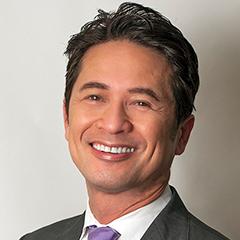It’s LGBT Pride Month, and we’re celebrating all month long with a series of interviews with staff at SAGE || Advocacy and Services for LGBT Elders. Today’s interview is with Dr. Diosdado Gica, Chief Program Officer. Dio presented with the Diverse Elders Coalition during the 2017 Aging in America conference in Chicago, IL. Here he talks about Pride Month, intersectionality, and what it means to have a safe place to call your home.
 What is your role with SAGE?
What is your role with SAGE?
I am SAGE’s Chief Program Officer, and in addition to managing the direct services we provide here in New York City through our SAGE Centers and our care management programs, I’m also really focused on developing and expanding programs and services to a national scale. One of our most recent accomplishments is the new SAGE Health Storylines app, which is available not just to SAGE constituents, but also to any LGBT older adult living with HIV across the country. We want to do more technology-enabled programming and services, which will help expand our reach. Many of our SAGE affiliate centers around the country have only one or two staff people, or are completely volunteer-run, so technology really helps us to connect with every LGBT older adult.
What does Pride Month mean to you?
I am a gay Asian man, and when I first came out in my 20s in the Bay Area, I worked with HIV/AIDS Hotline and the Asian AIDS Project. My generation came of age after the AIDS epidemic, so I saw firsthand how decimated the LGBTQ community was after that time. But we also rose up and met the challenge – we had to take care of and advocate for ourselves. We couldn’t rely on the mainstream to take care of us. So, to me, Pride means celebrating all that we have done.
During your presentation at ASA, you mentioned that you are an “immigrant, a person of color, and a gay man.” How do those intersecting identities influence your work and your advocacy?
I came to the United States when I was 12, from a very small village in the Philippines. I remember having to learn English. I remember feeling different because I was gay. I remember feeling isolated because I was Asian. As a teenager, I must have read every single gay novel that was ever published. I also read the novels written by Filipino immigrants, and the stories that came out of the AIDS crisis – all of these narratives resonated with me. For me, it’s important to give a voice to communities who are often denied the opportunity to speak.
I used to write a weekly column in a now-defunct local Bay Area magazine called CreamPuff. My column was called “The Rice Corner,” and it gave a voice to the LGBT Asian American/Pacific Islander (AAPI) perspective. Being a minority within the minority, we really needed to – and still need to! – make space for the issues that disproportionately impacted us. These intersecting identities have always been about about fighting for having a voice, and making sure that my voice reflects all of those experiences. And now I use my role at SAGE to give a platform to LGBT older adults.
Why did you decide to become an aging advocate?
I have thought about aging for a long time. LGBT people often don’t have a traditional family structure. We might not have children. So there is a real fear about who will take care of us as we age. When we’re younger, in our 20s and 30s, we find our voice and we speak up for ourselves. But as you get older, especially in the LGBT community, you start to feel more and more invisible. You might not have anyone to protect you.
I’m in my late 40s now, and I think about aging all of the time. I came to SAGE to create safety nets for LGBT older adults, especially since those traditional structures are not available to us.
What is the biggest issue faced by LGBTQ elders, and how can our readers help?
Your home should be your sanctuary: after going out into the world during the day, you should feel safe and comfortable in your home. Home should be where you replenish, where you can enjoy your life without the pressures of the outside world. But many LGBT older adults do not have a home that feels like a safe haven.
What we are trying to do here in New York City, and nationally with our National LGBT Elder Housing Initiative, is to create LGBT-friendly housing for our communities to live independently, to age in place – to create a safe place to call home. This year, we are launching two new LGBT elder housing communities – one in Brooklyn and one in the Bronx. We will be breaking ground on the Brooklyn site next month, so this idea is becoming reality. And we want other cities to follow suit by creating homes that are LGBT-friendly. Our communities shouldn’t be afraid that we won’t be taken care of with dignity as we age.
This interview has been condensed and edited.
The opinions expressed in this article are those of the author and do not necessarily reflect those of the Diverse Elders Coalition.

